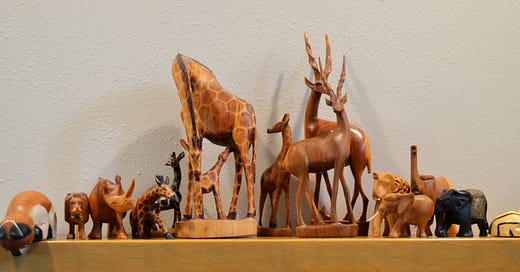This is the fourth in a series of eight bonus posts from A World in a Grain of Sand. This past Friday was the third, and can be found here.
Special Announcement for Pella-area Substack Readers:
Pella’s The Work of Our Hands fair-trade store is having a drawing for two free copies of A World in a Grain of Sand on February 10. Stop in, mention you saw this drawing online in my column, and register!
All people who register at The Work of Our Hands for the book drawing but do not win will qualify for a 25% discount on the price from me. (I will email you after the February 10 drawing to check with you.)
Carving Collection
“What can we get Dad for Christmas? For Father’s Day? For his birthday?” It was a question our sons often asked me when they were growing up.
And for many years, their first choice, instead of a tie or a handkerchief, was a hand-carved wooden animal. We went to the downtown Pella store together. They counted up their savings, and they selected a carving they could afford.
Gradually a collection of carvings grew. It now sits atop the bookshelves in our great room.
The collection includes a lion, a hippo, two cats, two antelope, four elephants, and five giraffes. The lion is primitive, its mane crudely carved. Many others show great skill.
Some are especially appealing. A baby giraffe nurses while his mother towers above him, her long neck curved down so she can nudge him with her nose. A cat peers down, her nose draped over the edge of the shelf. Another sleeps, her body curled in a circle. A baby elephant is in the womb of its mother, both carved from a single piece of wood.
Each year we shopped for the carvings in the same Pella store, The Work of Our Hands. It is a fair-trade store that was launched in Pella in 1990. Each carving was handmade by an artisan from a developing country, such as Indonesia, Thailand, Kenya. The items were made and purchased under Fairtrade International standards.
The goal of Fairtrade International standards is “to tackle poverty and empower producers in the poorest countries in the world.” Small-scale producers and workers are among the most marginalized by the global trade system. In the Fairtrade system, producers must receive a price which covers the average cost of production. No forced labor or child labor is permitted. Food producers and artisans have a fifty percent vote in the organizations handling their merchandise. Each Fairtrade organization is independently certified as adhering to these standards and more.
Eventually, to our disappointment, The Work of Our Hands discontinued the carved animals. The store still carried fair-trade items, but either those carvings had saturated the local market or public taste shifted to other products.
Our sons became adults, and sometimes when they asked for my Christmas wish list, I simply said, “Anything from a fair-trade store.” And when I opened my gift of handmade jewelry or home decor, I pictured the men and women in their homes or small shops plying their craft, receiving fair wages, and finding a path out of poverty.
Buying a fair-trade item creates a double gift: a beautiful handmade item for a recipient and a living wage for an artisan in a developing country.
After downsizing, our space for new home decor has shrunk. But I still enjoy buying fair-trade consumables, such as coffee, chocolate, and olive oil.
When I sit at the table cradling a cup of coffee at breakfast, the mug warms my hands.
And when I look toward the carving collection, the memories warm my heart.
In Pella, A World in a Grain of Sand is available from Carol (carolvk13@gmail.com or Pella’s Curiosity Shop. It is also available on Amazon.
Carol Van Klompenburg is a writer living in Pella, Iowa. She has a BA in English and an MA in Theater Arts — and is available for reading performances of her work.
Amazon Book Review of A World in a Grain of Sand
My mother's tears as she sorted belongings for yet another move belied her words, "It's just stuff." Carol's stories prompted this memory along with the realization that Mom's tears were not for the "stuff," but the memories attached to them. This book is an invitation to look around and share the stories our "stuff" contains.
Kathleen Evenhouse, Author of Less Than a Widow




